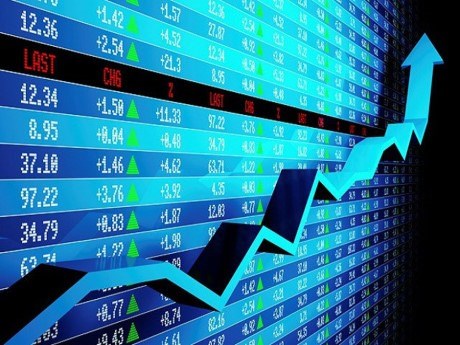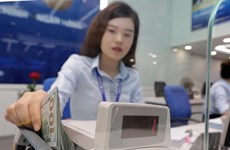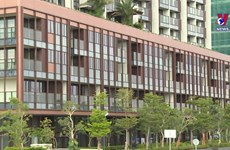Vietnam's stock market to remain strong in second half of 2017
Vietnam’s stock market will rise higher in the second half of 2017 provided macro-economic conditions remain positive as they were in the first half, experts have said.
 Vietnam's stock market will rise higher in the second half of 2017 provided macro-economic conditions remain positive as they were in the first half. (Photo: laodong.com.vn)
Vietnam's stock market will rise higher in the second half of 2017 provided macro-economic conditions remain positive as they were in the first half. (Photo: laodong.com.vn)Hanoi (VNA) - Vietnam’s stock market will rise higher in the second half of 2017 provided macro-economic conditions remain positive as they were in the first half, experts have said.
In the first half of 2017, major sectors of the Vietnamese economy recorded good growth rates, according to analyst Nguyen Duc Hung Linh of Sai Gon Securities Inc (SSI).
The gross domestic product (GDP) growth rate of Vietnam in the first two quarters of 2017 were 5.2 percent and 6.2 percent, respectively, Linh said at a conference last weekend.
Those growth rates were attributed to improvements in manufacturing, retail and whole sale, construction, service supply and finance-banking sectors.
The annual growth rates that those sectors had posted so far were 10.5 percent, 7.1 percent, 8.5 percent, 8.9 percent and 7.7 percent, respectively.
Among sectors that had underperformed, Linh highlighted that the real estate and mining-energy sectors still had room for improvement.
While the property sector benefited from low lending interest rates, high credit growth and strong market demand for real estate products, it would be possible for Vietnam to record an annual GDP growth rate of 7 percent if the country managed to boost its energy and mining income, Linh said.
On the stock market, the benchmark VN Index on the HCM Stock Exchange has gained 15.6 percent since the beginning of the year and the HNX Index on the Hanoi Stock Exchange has increased by 23 percent.
Market capitalisation reached 2.54 quadrillion VND (112.87 billion USD) in the first six months, an increase of 25.7 percent from last year-end and equal to 56.4 percent of Vietnam’s total GDP value.
With such growth rates on both local exchanges, the real value of the Vietnamese stock market was below investor expectations and the market risks were low, Nguyen The Minh, another analyst at SSI said.
According to Minh, investors were attracted to Vietnam’s stock market as the profitability ratios during the first half of 2017 for the VN Index and HNX Index were higher than other major indices in the region such as the Republic of Korea’s Kospi, Hong Kong’s Hang Seng Index and Japan’s Nikkei 225 Index.
The price-to-earnings (P/E) ratio in Vietnam’s stock market was also among the lowest compared to other regional indices, he said. The number for Vietnam was 16.5, only higher than Thailand (16.0) and lower than others such as China (17.1), Japan (19.2) and Indonesia (24.9).
In addition, new Government policies were expected to boost local stock markets, including those to stabilise and improve macro-economic conditions, equitise and trade State-owned Enterprises (SOEs) on the securities market, increase foreign ownership in local companies and tighten investment requirements for the real estate market, he said.
Advantages for Vietnam’s stock market would include lower lending rates to boost local businesses and production, declining inflation and stable foreign exchange rates, Le Xuan Nghia, former vice chairman of the National Financial Supervisory Commission, told Dau tu Chung Khoan (Securities Investment) magazine.
He said that local businesses will also benefit from the Government’s determination and efforts to improve conditions for investment and businesses, and active participation in free trade agreements.
Those actions have helped draw more foreign capital than expected due to the withdrawal of the US from the Trans-Pacific Partnership (TPP) and the volatility of the world’s political and economic conditions, Nghia said.
Foreign investors have considered Vietnam’s stock market one of the most attractive due to the potential growth of the country’s economy in the second half of 2017. The country has quite high competitiveness and good creditability, he added.
The active participation of the Government in free trade agreements and its efforts to speed up the restructuring and equitisation of SOEs were other elements drawing the attention of foreign investors, he said.
However, the local stock market will face competition from others such as the recovery of the US and European markets on their improved economic conditions, Nghia said.
He added that stimulus packages in Europe and Japan may not be extended, which could increase their interest rates, drawing the return of foreign investments to those markets.
In addition, sources of foreign investment that can have a big impact on Vietnam’s stock market mainly come from China, Taiwan and Hong Kong. While the Chinese regulators are tightening their policies on indirect overseas investment, it would be harder for Vietnamese firms to draw investment from those investors at least until the end of this year, Nghia said.-VNA













